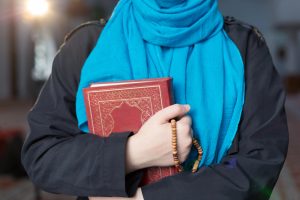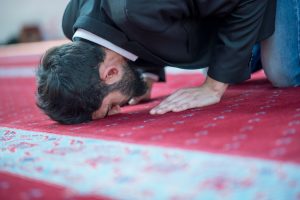The Islamic religion is a strong and proud one that has the same objective tendencies found within Christianity. These objective dogmas and beliefs present a theology that points to Islam as the only way to God and as a faith that encompasses the complete truth of God’s revelation. While other faiths are not mocked or looked down upon by Muslims, fanatics like found in any religion, have created images of terrorists and murderers that far from represent the true tenets of Islam. Yet, combined with a mutual historical rivalry with the Christian West, later colonization by the then secular West, has created deep gaps between the predominant Western culture of the United States and Arab Muslims. In particular with US foreign policies in Israel and Palestine and the wars in Iraq, and the events of 911, there exists many bias and prejudices between both societies. These biases can be on full display when migrants from the Middle East who profess Islam come into contact with both many Christian, as well as, secular Americans of European descent. Hence there exists a bi polarizing system of thought between many Westerners and Muslims that mutually accuse one of oppressor and the other as terrorist. This is one of the biggest thing Western counselors must dismiss from their own prejudice as well as Muslim clients who come for therapeutic care.
Please also review AIHCP’s Grief Counseling Certification and see if it meets your academic and professional goals.
The American Arabic Muslim Profile

The Arabic Muslim represents over 1.7 to 5.1 million Americans living within the United States as citizens or living on Visas (Pederson, 2018, p. 188). They range in all socio-economic classes but for the most part exceed the national level of income due their commitment to the educational process. For a many, not all, Islam plays a key role in their life. Of course, there are variances of adherence to the faith, as in any faith, but for the most part, most Arab Americans profess a belief in Islam. Islam means submission to God (Pederson, 2018, p. 186). It is an Abrahamic faith that shares in the same belief of the same God professed in Judaism and Christianity. Albeit, the interpretation of the God of Abraham is quite different than Christians which profess the revelation of the Trinity and belief in the Incarnation of the Logos and Jesus Christ as both God and man. Another key difference is the belief in Mohammad as the last messenger sent by God to fulfill the Judaic and Christian religions. This message is primarily found in the Quaran and the story of God’s final revelation through Mohammad.
The faith of Islam teaches key core rules that are expected of all adherents to believe and commit oneself. First, the Shahada or profession of faith that there is only God who is Allah and that Mohammad is His prophet. Second, is the Siyam, or fasting period during Ramadan. Third, the Salah, or call to prayer five times a day. Fourth, the Zalah, or tax to be given to the poor, and finally the hajj, or pilgrimage to Mecca if one can afford (Pedersen, 2018, p.186). These five core concepts shape the inner spiritualty and faith of the Muslim as well as direct one to the needs of others within the community.
Islamic cultures, like all the Abrahamic religions, emphasize the value of family and the importance of authority, especially from a patriarchal standpoint. In some cases, Islam retains a more strict stance on male authority than Judaism and Christianity, especially since Islam historically has been less exposed to secularism than Christian and Jewish communities. Within Islam, the individual and family are interdependent and the family is ruled via a patriarchal system.
Men have strict gender roles as well as women. Both are expected to adhere to rituals and social norms associated with their gender. Many of these gender roles in extreme cases lead to the abuse or subjugation of women. Many women through openly choose the traditions and limit themselves in what they may wear or do individually or even advance themselves academically or professionally. Again, this is not the case in all Muslim nations. In more strict Muslim nations where personal freedoms are tied to Sharia law, women are persecuted but in other Arabic nations, women are able to excel while also holding to faith and social norms of dress and of wearing the Hijab (head covering) as a sign of Muslim identity and pride (Pederson, 2018, p. 187).
Individual Challenges and Collective Challenges of Arabic Muslim Americans
Like all acculturation cases, when two different cultures meet, there is reaction within the person. One cannot simply generalize because the nature of individuals are so different. In essence based on general and individual traits, individuals assimilate or become loss in the predominant host culture, integrate or retain old values while interacting in the predominant society, separate or denounce the host society, or become marginalized, losing interest in own culture and also not integrating into the predominant culture (Pederson, 2018, p. 384). Many first immigrants initially did not have the religious facilities to help integrate. Like past Catholic immigrants, they needed to found their own schools, hospitals and agencies that best met their unique spiritual and cultural needs.
With Muslim Americans, most acculturation experiences are due to migration to the United States. Many came for a better life, while others fled persecution or authoritarian regimes. In processing the acculturation, there are numerous points to understand for each group or individual’s unique experience. Some Muslim Americans may have greater social support from co-nationals and family, as well as from the local American community. In addition to social support, family support can play a key role in how a Muslim American perceives and blends into the American melting pot. While the predominant American cultures has its own social norms, the inner dynamics of the Muslim family may have quite different values and norms. (Pederson, 2018, p. 391). In these cases, how have family relationships been altered? How have duties and influences of obligation changed? How do family members agree or disagree with new norms that are being introduced into their lives and how does this create potential problems (Pederson, 2018, p. 392). It is documented that acculturation outcomes for immigrants vary greatly between different generation (Pederson, 2018, p. 394). The fear of American secular values which are contrary to many Muslim beliefs can become a great stress for the Islamic family with children born within the United States. Some Islamic families that retain a stronger tradition, may see youth with a more foreclosed and diffused ego identity that connects to the needs of the community than oneself, while others more exposed to secularism may begin to seek out individualism at the expense of the family approval (Pederson, 2018, p. 190). For those who migrated, many Islamic immigrants hold even tighter to beliefs than they may have when in the country of origin because they hope to maintain their identity (Pederson, 2018. p. 395). Others who already possess a strong identity, sometimes are able to adjust to the American culture with less issue because of their strong sense of identity (Pederson, 2018, p. 395). With the pressure of secularism, sexual images, and individualist call of the Western culture constantly displaying itself, many younger Muslims or next generation American Muslims sometimes find themselves at odds with the family. Furthermore, marriages can sometimes occur with other Muslim families that are less traditional and lead also to additional stressors. In many cases, the traditional laws that are tied with the faith and marriage can sometimes come into conflict with American social laws. This also involves adjustment.

Some Muslims who are secularized may find themselves at odds with their faith. There may exist great guilt if one accepts different moral life styles. In this way, spirituality can play a negative role in coping with moral decisions and loss for secularized Muslims. The Quran, like the Bible, dictates a very clear moral code to be followed. It emphasizes that all deeds one commits will be accounted for and illustrates graphic depictions of Hell and punishment for those who not adhere (Johnson, 1998, P. 140). In Islam, there is a scale of balance between good and evil deeds which will dictate whether a Muslim will enter into paradise or torment (Johnson, 1998, p, 141). Many American Muslims may also have difficulty integrating with what they perceive as an immoral Western secular society. While Americanism permits more freedom of choice and morality, many of these freedoms present immoralities that are considered sins in Islam, but as well as Christianity and Judaism. Sometimes, Muslim Americans who migrate from Sharia Law nations may become culture shocked to see what is perceived as criminal immoral offenses under Sharia Law to be freedoms of choice within the United States. Some Muslims may be able to see the value of freedom at the price of immoral choice, but some may have harder difficulties seeing freedom and immorality side by side. This is especially true with homosexuality and its public display in the West and how American Muslims may have difficulty comprehending it. While some Muslim Americans may have harder difficulties, many embrace American idealism and remain socially conservative, as any Christian American and voice their disagreements and disappointments at the ballot box. Within Sharia Law, it is seen that immorality itself is a detriment to society and looks to protect the greater whole based upon Islam’s moral beliefs and to live a moral life is contributing to being a good citizen. Hence, for many the moral tenets of Sharia Law embraces good life and maintaining a healthy social structure.
Obviously, the view of the immigrating culture and the acceptance of that identity is also key. Whether resilient or not, one does also carry their cultural identity and race with them and the biases and prejudices of another land rarely will acknowledge the individual but instead recognize the bias associated with a culture. Muslims, especially due to the 911 terrorist attacks, are seen as a very marginalized and disenfranchised society by many in the West, This leads to difficulty in acculturating in a healthy way (Pederson, 2018. p. 395). This leads to labels of terrorist or fanatic as well as microaggressions in schools, airports or other public places. The American Muslim in many ways must learn to balance his/her American identity as well as Muslim identity. The proof to show oneself as an American as a good American is as strong as it was for Irish Catholics to prove their allegiance to the flag. Muslim Americans face similar challenges in the public eye especially when many foreign policies within the United States are contrary to the needs of Muslims throughout the world such as in Palestine.
Many Palestinian Americans feel as if they are labeled as terrorists, when the reality is their story is always second hand to the Jewish narrative. Within the issue arises the reintroduction of Israel into the Middle East in in 1948 and the far reaching effects of unfair practices by the Israeli government in regards to the property of the host Palestinians. After decades of war, unjust atrocities by both sides, and a labeling of terrorist to only the Palestinian and not also the Israeli, has lead to an oppression within itself for many Muslim Americans who are chastised or seen an Un-American for protesting Israeli domestic policies. The recent war of 2023 and 2024 has shown the true imbalance of presentation in this sad story and the need for stronger two state solution policies that respect the Palestinian plight as much as the Israeli concerns of existence. Yet for the Muslim American, this remains an issue that many deal with on a daily basis where they devotion to the United States is unjustly called into question. Many Muslims must balance love and patriotism of nation with discontent with American foreign policy. It should also be equally noted that many Muslim Americans live in communities that work together or have little interest in political ideals pushed in mainstream media. Hence there are multiple stories and experiences for different Muslim Americans based on their unique up-brining, location and community that can express little to no discrimination based on their unique situation.
Aside from these social and historical labels, as well as stressors of Islamic culture to adjust to the secularism, there is the individual who also faces stress, griefs and losses due to acculturation within his/her own culture. Since Islamic and Arabic tradition is fiercely collective and family valued, those who deviate from the culture can find themselves at odd with family and the security of the family. The individual can submit to the family dynamic and receive support or relinquish the support for more personal freedom and choices (Pederson, 2018, p. 189). The quest for individualist expression can be with young women seeking an education or professional career, or youth experiencing drinking or more free moral living with sexuality. These choices can lead to greater alienation and rebuke from the hierarchy of the family. Many Muslims feel a social obligation to show respect (ihtiram), fulfill social duties (wajib) and avoid confrontations at all costs with elder family members (mosayara) (Pederson, 2018, p. 189). There comes into play then a outward false appearance with a closet life style to avoid confrontation. This can lead to great dysfunction for the individual as they attempt to balance mosayara with their own personal life styles. This can lead to strong cases of depression (Pederson, 2018, p. 193).
Counseling American Muslims
It is obviously important for counselors to be multi culturally competent with faith, family and the general history of Islam and how it translates into the unique individual experience. It is also noted, many Muslims may not trust Western counselors. While therapy is utilized, many personal cases of grief and loss are usually discussed within the family itself. For many grief and loss is seen as fate and something ordained by God. One is to submit to faith and place all trust in God. While spirituality is critical in healing, it sometimes can also become dysfunctional when faith is not properly manifested and understood in a healthy way. Anger against God could be kept held within and this is not healthy. Many Muslims may prefer a fellow Muslim counselor who understands the faith and the dangers of the secular world, but others may feel embarrassed or exposed if speaking with a counselor within the community and may purposely seek counselors outside their social confines to discuss issues. Western counselors must also be aware, in many cases, women may feel more uncomfortable with a man alone or speaking about sensitive issues of sex with a man due to their religious beliefs.

One must also understand the transference and countertransference of bias between Western counselor and Muslim client. The Western counselor may have very strong anti-Islamic views about treatment of women or the wars in the Middle East or the event of 911. These biases can be very dangerous to counseling but also being a fair and just person. Other counselors may have a negative view on authoritarian and patriarchal family structures. Counselors need to dismiss their own cultural understanding of family and not ridicule other cultural norms within the family of the Muslim client (Pederson, 2018, p. 191). In addition, Muslim clients may have their own prejudices against Americans from wars fought on their soil or pro-Israeli policies. They may see Americans as oppressors because of this. When dealing with this, it is important when collective words such as “we” or direct accusatory words as “you” to avoid taking it personally. Therapists should not take offense but instead defuse the situation by questioning the pronouns and differentiating him/herself from the collective. A good response would be when the pronoun “you” is stated, do you mean “America” or myself the therapist?(Pederson, 2018, p. 195)
When first meeting with any immigrant, whether Muslim or not, it is always important to calculate the level of acculturation. Is the client an immigrant as an adult or a child? Was the client born in the United States? In regards to the family, what is the level of dependence of the Muslim client with his/her family. Does the client possess independence or is the client more dependent upon the family (Pederson 2018, p. 195). In some cases, consultation with the family is also key in helping Muslim clients who may exhibit more interdependence, while those who do not, may not need this type of inclusion.
In regards to grief, again, many Muslims turn to the community and faith to understand loss. They see prayer as the primary tool utilized to overcome grief and not usually conventional counseling. Many contend that everything happens for a reason or Allah has willed it and it must be accepted. Counselors, especially grief counselors, need to be aware of internal emotions tied to grief and loss with religion and how they all interplay with mental health of the individual.
In addition, it is important to understand Islamic burial and mourning in grief counseling. Muslims themselves go through a very important burial process where purification and cleaning of the body is important. Before death, prayers are recited from the Quran and following the death there is a cleaning of the body. Usually professional cleaners are employed to fulfill this funeral process. The body’s orifices are plugged and then wrapped in a white shroud (Johnson, 1998, p. 136-137). Following, the person is laid in a simple coffin and processed for burial. Upon the grave site, the body is removed from the coffin and placed in the ground. In Islam, it is believed that the body must return to the ground as soon as possible. While traditionally, mourning was forbidden by Mohammad, today, many women still cry loudly, or even professional mourners are hired (Johnson, 1998, p. 137). However, the crying must not be associated with doubt or lack of faith in God’s goodness. Hence grief and turning to Allah is acceptable when it is understood that Allah is the source of grief and suffering but it is part of a larger plan. Grief Counselors may sometimes need to access the spiritual mindset if a Muslim client is grieving the loss of a loved one and to ascertain if religious beliefs are preventing mourning. Like any religion, the faith can give comfort, but sometimes it can also lead to unneeded pathology.
Conclusion
Muslim Americans, like all ethnic groups, face their own unique challenges in acculturation into the melting pot known as America. Oppression, stereotypes and negative history with the United States all play key roles in racism against Muslim Americans. Understanding Islam, Arabic cultural norms and family structure and the individual person, counselors can better help Muslim clients. In addition, counselors must be aware of inherent bias the may possess or biases that might exist within the Muslim client towards the West. Counselors have unique challenges they must meet if they wish to better help Muslim clients in everyday issues.

Please also review AIHCP’s behavioral health certifications for those in human service and counseling fields. The programs are online and independent study and open to qualified professionals seeking a four year certification. The most popular program is AIHCP and the American Academy of Grief Counseling’s, Grief Counseling Certification. Upon completion of the four core courses, one can apply for the four year certification as a grief counselor.
References
Pederson, P. et. al. (2018). “Counseling Across Cultures”. (7th) Cengage
Johnson, C. & McGhee, M (1998). “How Different Religions View Death and the After Life”(2nd). The Charles Press
Additional Resources
APA. “Shifa: A Guide of Contemporary and Traditional Healing Practices for Muslim Americans”. Access here
Khawaja, S. & Khawaja, N. (2019). “Coping with loss and bereavement: An Islamic perspective”. New Zealand Journal of Psychology Vol. 48, No. 1 April 2019. Access here
Saherwala, Z. et al. (2021). “Providing Culturally Competent Mental Health Care for Muslim Women”. Innov Clin Neurosci. 2021 Apr-Jun; 18(4-6): 33–39. Access here
Rassool, G. (2015). “Cultural Competence in Counseling the Muslim Patient: Implications for Mental Health”. Archives of Psychiatric Nursing Volume 29, Issue 5, October 2015, Pages 321-325. Access here
